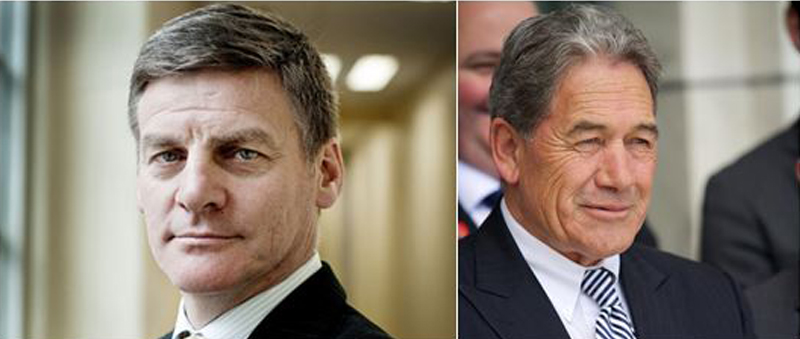A Winning Performance, Sort Of

Congratulations Prime Minister Bill English and the National Party on winning the popular vote on Saturday’s New Zealand general election. National are a middle-ground conservative/progressive party which has commandeered the center of New Zealand’s remarkably stable political system for the last nine years. The prospect of a fourth term in government for the National Party would match a record not repeated since 1969. Bill English proved himself as a winning and popular candidate despite a vibrant challenge from new Labour leader Jacinda Arden. Both English and Arden are from heartland New Zealand roots and both have the interests of New Zealand people in their hearts.
The election result is, however, far from clear. New Zealand has a proportional representation system that has produced coalition governments since the MMP system was introduced. The center of attention right at the moment is not 46% vote winner English, but New Zealand First leader Winston Peters on 7.5% of the vote, who for the third time holds the balance of power. Once with the National Party, Peters formed his own party with a largely retired following of people wanting a fair go in return for their lifetime of hard work. In many ways Winston Peters is an old-fashioned socialist, in the best possible meaning of the term. A look at his speeches shows him battling for people who are disadvantaged by the economic system including middle income New Zealanders. He has served several roles in government, and by many accounts was an outstanding Foreign Affairs minister, pressing for an expansion of the ministry’s outreach to the world. He also has a reputation for turning things toxic, enjoying the battle for the sake of it. A divider not an inspirer. The balance of power comes with immense responsibility – and 7.5% of the popular vote gets a substantive seat at the table, not a mandate to dictate.
Peters has held the country in suspense – to ransom some would say – in previous government formations. There are a number of arithmetical routes to be negotiated in the days ahead. One political analyst said Peters has more in common with Labour – nine policies – than National – with three policies in common. My own belief is that the first sitdown needs to be with National as the winner of the popular vote. There is no rule in MMP that says this should be so, but the weight of the popular vote must compel him to respect this and forge a workable path with National. MMP is the ultimate consensus tool, and it is disappointing in my mind that no political leader since MMP was introduced has had the political vision and willpower to stoke the imagination of voters and win an absolute majority of votes. It’s difficult to achieve anywhere except for Russia and your name is Putin. John Key (now Sir John) did a masterful job – in any worldwide analysis you can do – of actually increasing the vote of his party in two elections subsequent to first taking the Treasury benches. New Zealand Prime Ministers however have tended to be political managers, deliverers and incrementalists, rushing at all costs to avoid “the vision thing.” More is the pity.
New Zealand is a remarkable country in so many respects, with gaping wounds. We love to be #1 in the world, and we are indeed in a whole bunch of top 10s. Last week an international survey placed us #32 for child health, with the incidence of criminal child abuse weighing heavily. Our young people kill themselves more than anywhere in the world (well done NZ Herald for the recent Break the Silence series on examining and seeking solutions to this scourge). Our prison system represents the same institutional race profile seen in US states like Louisiana and Alabama. One business commentator evidenced that New Zealand is in a productivity recession – an economy fueled by immigration and tourism without adequate infrastructure, and not enough global scale of industry (though its coming). To frame the issue, one commentator asked “Why is our GDP per capita so low?” citing our GDP is about US $37,000 per person. Australia’s is $48,000, the United States is $57,000, and Ireland’s is $69,000.
There are things to sort out, things in the New Zealand psyche and operation that need repair and reframing, and it will take real political leadership – not entitlement – to overcome our deficiencies. Godspeed to all political leaders that they work out a deal that moves New Zealand forward and makes things happen.


